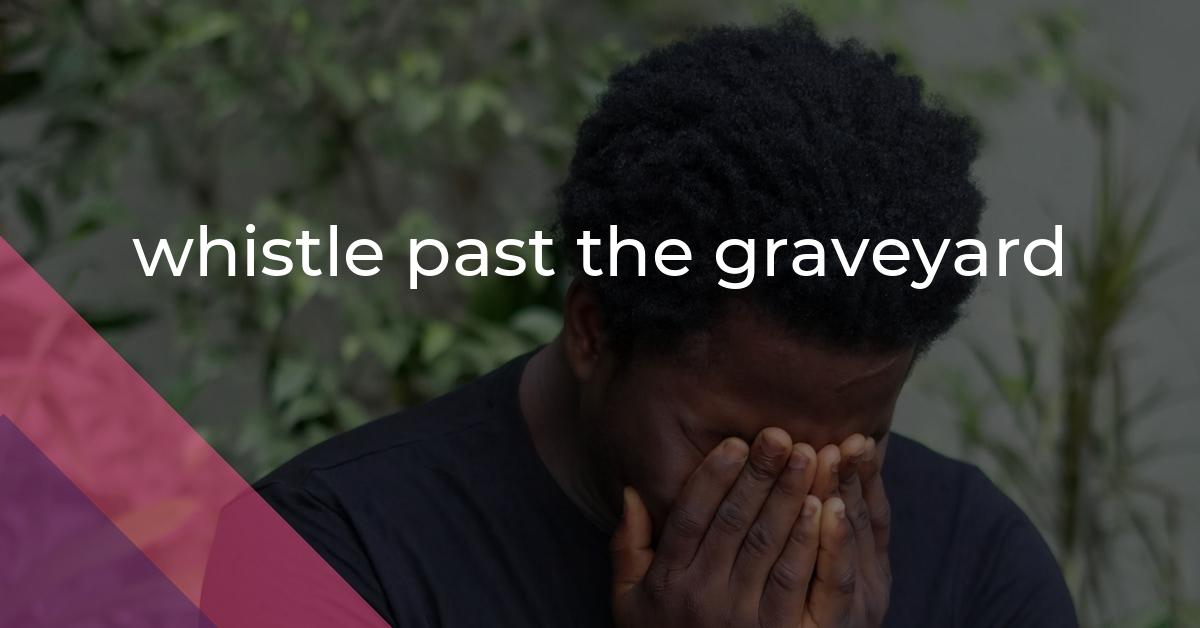whistle past the graveyard: Idiom Meaning and Origin
What does ‘whistle past the graveyard’ mean?
The phrase "whistle past the graveyard" means to act courageously or cheerfully in a dangerous or frightening situation in order to mask one's fear or anxiety.

Idiom Explorer
The idiom "yield the ghost" means to die or cease to function. It is often used to describe the moment when someone passes away or when a machine or device finally stops working.
The idiom "whistle in the wind" means to make an attempt or statement that has no result or impact, as the sound of a whistle is often carried away and lost in the wind.
The idiom *whistle in the dark* means to pretend to be brave or optimistic in a difficult or frightening situation, often to hide one's fear or uncertainty.
The idiom "whistle for" means to expect or hope for something that is unlikely to happen or is not forthcoming.
The idiom "whistle Dixie" means to engage in self-delusion or excessive optimism about a situation that is unlikely to be successful or favorable.
The idiom "whip through" means to do something quickly and effortlessly, often completing a task or activity in a short amount of time.
The idiom "weather the storm" means to endure or survive a difficult or challenging situation, often through perseverance and resilience.
The idiom "waste breath" means to spend time and effort saying something that will not be listened to or taken seriously, resulting in a pointless or futile act of speaking.
The idiom "walk on eggshells" means to proceed with extreme caution and sensitivity in order to avoid upsetting or angering someone.
Deciphering the Evasion
Whistle past the graveyard is an idiom commonly used in American English. It means to act or speak as if one is unconcerned or unafraid when facing danger, difficulty or fear. This idiom is often used to describe a situation where someone is trying to appear brave or nonchalant in the face of uncertainty or danger.
There are a few related idioms that can help us understand the nuances of "whistle past the graveyard". These idioms include "whistle in the dark", "put it past", "whistle for", and "whistle in the wind". Let's explore each of these idioms in the context of "whistle past the graveyard".
Whistle in the dark is similar to "whistle past the graveyard" in that it also describes someone trying to appear brave or unconcerned in a frightening or uncertain situation. However, "whistle in the dark" emphasizes the fact that the person's attempts to appear unafraid are actually futile. It suggests that their bravado is just a facade and that they are still very much scared or worried.
Put it past is another related idiom that adds another layer of meaning to "whistle past the graveyard". To "put it past" means to consider something unlikely or improbable. In the context of "whistle past the graveyard", this idiom can imply that the person is aware of the danger or fear they are facing but chooses to dismiss it as unlikely or irrelevant. They are essentially downplaying the seriousness of the situation.
Whistle for is a related idiom that is often used to describe a situation where someone is unsuccessfully trying to attract attention or assistance. In the context of "whistle past the graveyard", it can imply that the person is pretending not to need help or support in a difficult or dangerous situation. They are trying to handle everything on their own, even if it's not the best course of action.
Whistle in the wind is yet another related idiom that adds to the understanding of "whistle past the graveyard". To "whistle in the wind" means to engage in an futile effort or to express something that goes unnoticed or unheeded. In the context of "whistle past the graveyard", it can suggest that the person's attempts to appear brave or unconcerned are ultimately ineffective or meaningless. Their actions or words are disregarded or simply blow away without making any impact.
Regardless of its origin, "whistle past the graveyard" has become a common phrase in American English and is used in various contexts. It is often employed to describe instances where someone is trying to downplay or ignore a serious or dangerous situation. For example, someone might say "I'm just whistling past the graveyard" to indicate that they are pretending not to be afraid or worried about something that is actually concerning or threatening.
This idiom serves as a reminder of the complex ways in which human emotions and behaviors can intersect. It reflects the universal experience of trying to appear calm and collected even when feeling anxious or vulnerable. The related idioms, "whistle in the dark", "put it past", "whistle for", and "whistle in the wind", further elucidate the different aspects and nuances of this idiom.
Example usage
Examples:
1. Despite the looming crisis, the company's CEO remained optimistic and continued to whistle past the graveyard, ignoring the signs of trouble.
2. Instead of facing his fears, he chose to whistle past the graveyard and pretend that everything was fine.
3. The politician evaded tough questions during the interview, choosing to whistle past the graveyard and steer the conversation toward safer topics.
More "Fear" idioms



